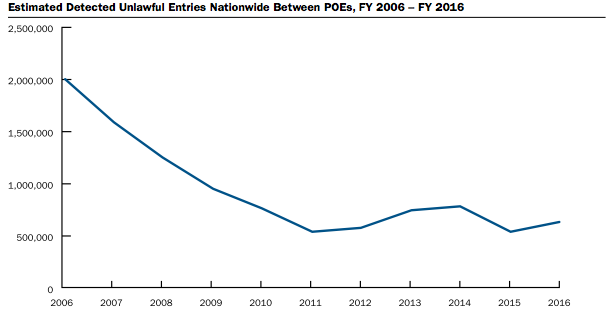Government remains deadlocked over border security
January 13, 2019
President Trump is seeking to make good on one of his greatest campaign promises: Erecting a border wall between the United States and Mexico.
However, opposition from his Democratic counterparts resulted in the longest government shutdown in U.S. history and has Trump considering a national state of emergency.
Trump referred to the flow of undocumented immigrants into the county as “a growing humanitarian and security crisis,” and as “a crisis of the heart [and] soul,” during an Oval Office address on Jan. 8. He said that undocumented immigration caused economic hardships for American citizens, and were responsible for many violent crimes and importing 90 percent of illegal narcotics into the country.
A report released by the Department of Homeland Security showed undocumented immigration has been falling for 12 years, from about 2 million detected unlawful entries in 2006 to around 624,00 in 2016. Undetected border crossings fell from approximately 851,000 to just under 62,000 during that time frame. The report also indicates that most illegal narcotics flow through legal ports of entry, not across the border.
Although 2016 saw more undocumented immigration than 2015, the overall trend has been downward.
Jacob Minock, president of College Republicans and a senior in mechanical engineering, said Americans want more border security and a physical border is a good way to do that.
“There are quite a lot of people crossing the border at areas where there’s no physical border,” Minock said. “It’s just open.”
Taylor Blair, president of Iowa State College Democrats and junior in industrial design, disagreed.
“The numbers don’t show that there’s a crisis at all,” Blair said. “If this were a real crisis Trump wouldn’t hesitate to declare a state of emergency like he is right now.”
Mack Shelley, a political science professor at Iowa State, called the border situation “a manufactured crisis,” but said Trump could successfully declare a state of emergency anyway.
Shelley said the legal language around declaring a state of emergency is loose and open to interpretation. However, getting the support for that decision could prove difficult.
“He could do it, but not easily,” Shelley said. “If he does, he can dedicate unused disaster relief funds, more than $13 billion, to deal with immigration. But we’re not going to run out of natural disasters, and the money would be much better spent on that.”
Minock said he does believe the amount of unlawful entries at the southern border is a national emergency but funding for the wall should still go through congressional channels.
“I don’t think Trump calling and using it as a state of emergency validates just straight up building the wall,” Minock said. “I think that all needs to go through getting congressional approval and get approved that way.”
Blair and Shelley also said the crime rates among undocumented immigrants tend to be lower than among the natural born population. Numerous studies, including one from the libertarian think tank the Cato Institute, back their claims.
A 2018 report from the Cato Institute analyzed criminal conviction rates among natural born immigrants, undocumented and documented immigrants, and found that natural born Americans have the highest conviction rates of those groups.
“Obviously we don’t want people commiting crimes,” Blair said. “But the data shows [undocumented immigrants] commit crimes at a lower rate. Besides, the argument doesn’t really make sense. It would be like shutting down every business in America because you found out some of them commit fraud.”
Minock disagreed, saying each study and its methodology should be examined carefully.
Shelley agreed that arguments against undocumented migrants based on crime rates aren’t valid, but said those arguments can still be persuasive.
“There are these stories, there was one quite recently in California, where an undocumented immigrant commits a violent crime,” Shelley said, referring to the killing of police officer Ronil Singh. “These stories are not data, but they produce a situation where it’s really easy to tell a story which becomes the rationale moving forward.”
Shelley said it becomes difficult to counter that rationale because supporters of Trump don’t often make appeals to data.
“Sarah Huckabee Sanders is a good example,” Shelley said, referring to the White House press secretary. “She’s really a true believer in this administration, and just the other week she claimed more than 4,000 terrorists were stopped by border security this year. Multiple outlets have proved that to be false, but once it’s said it becomes almost impossible to change the narrative for some people.”
Shelley referred to Sanders’s statements, which she made during a daily briefing and repeated on Fox News Sunday. NBC News, one of the outlets fact checking Sanders, reported that:
-
The figure Sanders used was from 2017, not 2018.
-
Most of the apprehensions happened at airports, not along the southern border.
-
Forty-one people on the Terror Screening Database were stopped at the southern border, and only six of them were “non-U.S. persons.”
NBC News used information provided by Secretary of Homeland Security Kirstjen Nielsen for their report.
“I think the wall represents immigration as a boogeyman,” Blair said. “It make immigration this big false-threat in his voters’ minds, and keeps them distracted from real problems, like workers’ rights and climate change.”
Shelley said using immigrants as a scapegoat is a very old trope of American politics.
“Unless you’re a Native American, you’re the product of immigration,” Shelley said. “These arguments were used against Japanese immigrants, Italian immigrants, Irish, you name it.”







